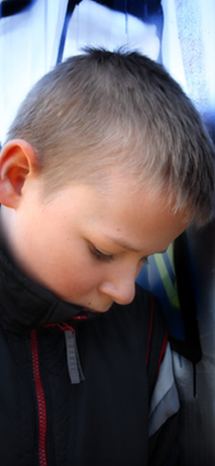[toggle type=”first” title=”Bullying”]
Bullying has devastating effects to everyone involved. If you are a teen being bullied know that you are not alone.
If you are a teen who is bullying, there are resources to help you stop.
Parents, if you are worried that your teen may be bullied or is the bully, there are warning signs to look out for as well as things you can do to help your child.
What is Bullying?
Bullying is repeated, persistent, and aggressive behaviour directed at an individual or individuals that is intended to cause fear and distress and/or harm to another person’s body, feelings, self-esteem, or reputation. Bullying is not something that anyone should have to deal with.
There are 4 main forms of Bullying, it can be:
- PHYSICAL – hitting, shoving, stealing, or damaging property
- VERBAL– name calling, mocking, or making sexist, racist, or homophobic comments
- SOCIAL– excluding others from a group or spreading gossip or rumours about them
- ELECTRONIC (commonly known as cyberbullying) – spreading rumours and hurtful comments through the use of e-mail, social media websites and text messaging.
 If you are being bullied there are always 4 numbers you can call where people will care, provide support and take your concerns seriously.
If you are being bullied there are always 4 numbers you can call where people will care, provide support and take your concerns seriously.
Essex County Diversion Program 519-253-3340 (8:30-4:30)
Kids Help Phone 1-800-668-6868 (24 Hours)
Distress Centre 519-256-5009 (Noon to Midnight)
Windsor Police 519-258-6111 (24 Hours)
[toggle type=”first” title=”How it Feels to be Bullied”]
- Fear Many young people who are being bullied feel trapped and scared. You might find yourself imagining future episodes of bullying.
- Guilt You might find yourself wondering what you did to provoke the bullying, and feeling bad about it. Whatever you have done in the past, you don’t deserve to be bullied. It’s not your fault.
- Anger You might think a lot about how you can fight back, or get revenge on the person who is bullying you. Being angry is a natural response to bullying, but know that aggression and violence are not the right answer.
- Shame You might be embarrassed or ashamed that this is happening to you, which can make you want to keep the bullying a secret. Try to remember that being bullied doesn’t make you weak, and reaching out for help is a sign of strength and courage.
- Sadness Bullying can make a lot of people sad. Sadness is a normal response to being hurt, and bullying is very hurtful.
- Pain Being bullied – even if no one’s hurting you physically – can really hurt. In fact, emotional pain can last longer than physical pain. If you’re experiencing bullying, you might also find that you’re more sensitive to other kinds of pain, or that you get more stomach aches or headaches than usual.
[/toggle]
[toggle title=”So What Can You Do If You Are Being Bullied? “]
Contact the police if you are being physically threatened or feel that your safety is in danger.
Get support, having people around that you can count on can help you feel better while you are dealing with bullying. Try opening up to people you trust about what you are going through, and don’t be afraid to ask them for help.
Stay safe, Staying physically and emotionally safe is the most important thing to do while you are dealing with bullying. Ask yourself: How can I stay safe while I’m around the person who is bullying me? You might want to walk with a friend to school, avoid certain routes around your neighbourhood, or temporarily close your Facebook account.
 If you feel embarrassed to let your friends know you are being bullied, try to keep in mind that most young people disapprove of bullying behaviour, and will most likely be on your side.
If you feel embarrassed to let your friends know you are being bullied, try to keep in mind that most young people disapprove of bullying behaviour, and will most likely be on your side.
If you need help coming up with a safety plan, you can always contact Kids Help Phone at 1-800-668-6868 or if you just need someone to talk to call the Distress Centre at 519-256-5000.
Take care of yourself. It can be stressful going through bullying, so try to be kind to yourself. Eating balanced meals, getting enough sleep, and staying active and social can help keep you healthy as you go through this difficult time. Writing about how you’re feeling in a journal can improve your mood and help you find solutions to your situation.
[/toggle]
[toggle title=”Are You Bullying Others?”]
Sometimes bullies don’t know that they are bullying and hurting others. There are different kinds of bullying, from physical bullying (hitting, shoving, and so on) to verbal and emotional bullying (calling names, teasing, or excluding someone) to Cyberbullying. Sometimes, verbal bullying can have the most serious effects. All bullying is wrong. It’s never OK. It is everyone’s right to be treated with respect and to feel safe. Just because you don’t like someone doesn’t mean it’s alright to abuse or harass them. The Effects of bullying include depression, hopelessness, anxiety, and school and relationship problems.
Many times, people bully someone who has bullied them first, or who they think deserves it in some way. But no matter what someone has done to you, it’s never OK to try to hurt them on purpose.
Just acknowledging that you have a problem is the first step towards taking responsibility and changing your behavior.
You can change! Lots of people who bully others learn how to behave differently, and have healthy friendships with other people.
Group bullying
A lot of bullying occurs in group situations, where three or more people bully one or two others. Sometimes, you might be involved in group bullying without really knowing who started it, or why you’re doing it. You might be following someone else’s lead, or you might find it just “happens” when a certain group is together.
If you’re involved in group bullying, and want to stop, good for you!
Here are some things you can try:
The next time your group is bullying others, try walking away, or telling the others to stop.
You can also try talking to others in the group once the bullying episode is over. Explain you don’t want to be involved anymore, and tell them that the next time it happens, you’ll take a stand.
[/toggle]
[toggle title=”Are You Ready To Stop Bullying?”]
If you are ready to stop bullying, start here by clicking on the link below. You will find out what kind of bully you are, the root of why you bully and how to prevent it from happening again. You are on the right track if you can recognize that you want to treat your peers better. Another option, if you want to change your behavior, it’s a good idea to get help, talk to a trusted adult, someone at school like a guidance counselor,
http://www.kidshelpphone.ca/Teens/InfoBooth/Bullying/I-want-to-stop-bullying.aspx
[/toggle]
[toggle title=”Signs Your Child May Be a Bully?”]
It is hard to imagine that your child may be a bully. We often want to think the best of our children. But the fact is, is that many youth are being bullied, each of these bullies have parents. If you are worried that you’re child may be a bully, there is a survey you can take online that may provide some clarity. Click on the link below for a Parenting Quiz: Is Your Child a Bully? http://parentingteens.about.com/library/sp/quiz/bullying/blbully.htm
Typically teens who are bullying others talk about their bullying behavior. If your child has some of the characteristics below they may be a bully;
Impulsive, hot-headed, dominant
Easily frustrated
Lacking empathy
Having difficulty following rules
Viewing violence in a positive way
Physically stronger than other children (this is more a characteristic of boy bullies)
Aggressive, even toward adults.
Likes pushing around and teasing other children.
Dominates and manipulates.
Is a smooth talker in tough situations.
[/toggle]
[toggle title=”Tips on How to Help Your Child if they are the Bully”]
If you suspect your child may be a bully, you need to get involved and stop their behavior. Your first response should NOT be to yell, scream or punish! Remember that many bullies are masking their own low self-esteem. However, it is critical to have zero-tolerance for bullying. Help your child to stop being a bully by doing the following things;
Make it clear to your child that you take bullying seriously and that you will not tolerate this behavior.
Talk to her about role-reversal: “how would it feel if you were the one being bullied?” This is a conversation you may need to have more than once.
Develop clear and consistent rules within your family for your children’s behavior.
Require him/her to apologize to the child he bullied-either verbally, in a letter (or sometimes both).
Continue to follow-up to make sure that the bullying has stopped. This means staying in touch with the school or with the bullied child’s parent. This is the hardest, but most important part. It shows your child that you take his behavior seriously and that bullying is unacceptable in your family.
Tell your child that if the bullying continues, there will be a serious consequence-mean it, and follow through!
Praise and reinforce your children for following rules and use non-physical, non-hostile consequences for rule violations
Spend more time with your child and carefully supervise and monitor his or her activities. Find out who your child’s friends are, and how and where they spend free time.
Build on your child’s talents by encouraging him or her to get involved in pro-social activities (such as clubs, music lessons, non-violent sports).
Share your concerns with your child’s teacher, counselor, and/or principal. Work together to send clear messages to your child that the bullying must stop.
If you and/or your child need additional help, talk with a school counselor and/or mental health professional.
[/toggle]
[toggle title=”Bullying Links for Parents and Youth”]
Reporting Bullying Online- http://reportbullying.com/
Kids Help Line http://www.kidshelpphone.ca/Teens/InfoBooth/Bullying.aspx
A Guide For Parents http://www.edu.gov.on.ca/eng/parents/bullying.pdf
Bullying Resource for Parents http://www.kidscape.org.uk/parents/index.asp
Bullying Resource for Teens http://www.youthconnect.ca/htdocs/english/findhelp/index.asp
Teen Resources- You are not alone http://werkidsmentalhealth.ca/local-services/bullying/
Cyber Bullying http://werkidsmentalhealth.ca/wp-content/uploads/2012/10/www.nasponline.org_resources_principals_CyberbullingNASSP-9-08.pdf
Bullying Support and Information http://www.bullying.org/index.cfm
Windsor Police Resources http://www.police.windsor.on.ca/Teen%20Scene/070719%20Cyberbullying.pdf
Parent Resources http://teenshealth.org/parent/emotions/
Teen Resources http://teenshealth.org/teen/school_jobs/
[/toggle]
[toggle title=”Sexting”]
You may have heard the term “sexting” but how much do you really know about it? Sexting is the act of sending sexually explicit messages, photographs, or videos through some form of technology in digital media, mainly involving cell phones and internet.
Why are teens sexting?
The Kids Help Line website says that flirtatious game playing, peer pressure and competition are common motivations. A survey by Girlfriend magazine found that four in ten girls had been asked to forward a nude photo of themselves. Similarly, another survey found 51% of teen girls had sent sexual messages or images due to male pressure. A majority of teen girls and boys also claimed they sent sexually suggestive content to be “fun or flirtatious”.
What teens may not realize is that there are a lot of consequences associated with sexting that they don’t think about when they hit “send”.
For example, pictures can be shared with others, posted online or elsewhere, they can be exposed to predators, and it can lead to criminal charges and school discipline. Not to mention there are a lot of emotional or psychological effects that can come with it such as depression, humiliation, poor image and self-esteem, anger, and even self-harm or suicide.
So, how can you keep your teens safe from sexting?
- Teach them about the dangers and consequences of “sexting”
- Set digital expectations for your teens and monitor their digital activity. Here is an example of a “phone contract” you can do with your teen: http://parentingteens.about.com/od/parentingcontracts/a/cell_phone.htm
- Familiarize yourself with technology and current trends
- Learn the “language of “sexting”, for some common sexting slang and terms check out this website: http://www.noslang.com/sexting.php
- Maintain open and honest communication with your teens
What are some warning signs that your teen could be engaging in “sexting”?
- Constantly on the computer or their cell phone
- Angry or defensive when you ask to see what they are doing or try take it away from them.
- Sudden reluctance to socialize with friends
- Disinterest or avoidance of school
- Dropping out of sports or other recreational activities
- Extreme sleeping behaviour (either more or less)
- Abnormal nail biting or hair pulling
- Abnormal changes in mood and/or behaviour
[/toggle]
[toggle title=”Lessons on Offender Accountability, Shoplifting and Stealing”]
Lessons on Offender Accountability, Shoplifting and Stealing
A Parent’s Guide to Understanding Stealing Behaviours
- Many teens shoplift in the presence of friends out of a desire to impress others, as oftentimes the teens that engage in the riskiest behaviors are the most popular with peers.
- Some teens use stealing as a way to assert their independence from the world of adult authority. Teenagers may steal out of a sense of boredom and a desire to seek excitement.
- They may feel that stealing, along with other negative behaviors, is the only way to get attention from parents, or they may steal as a way to exact revenge on someone believed to have harmed them or treated them unfairly.
- Lastly, teens may simply steal for practical reasons, such as the desire to have a particular item that they want, but cannot afford.
You may suspect shoplifting if you notice the following:
- If your child wears jewelry or clothing he or she did not purchase and did not receive as a gift, you should ask where the items came from. Follow up on the response.
- Some kids swap clothes and other items. However, if your child repeatedly claims to be borrowing items from a friend, contact the other parent(s) to see if they know about the swapping. Many times, electronic devices, including MP3 players, games or cell phones are the booty of shoplifting
- Packaging and price tags should tip off parents to potential shoplifting. Ask your child where the packaging came from.
- Peer pressure often leads to shoplifting episodes. Pay attention to your child’s friends and their habits. You might be surprised by what you find.

Child and adolescent psychiatrists recommend that when parents find out their child has stolen, they:
- tell the child that stealing is wrong
- help the youngster to pay for or return the stolen object
- make sure that the child does not benefit from the theft in any way
- avoid lecturing, predicting future bad behavior, or saying that they now consider the child to be a thief or a bad person
- make clear that this behavior is totally unacceptable within the family tradition and the community
[toggle title=”Websites related to adolescent stealing:”]
“Sticky fingers: the cost of shoplifting”
“Why is My Child Stealing and What Can I Do? Advice for Parents on Kids, Stealing and Shoplifting”
The Empowering Parents website is a great resource to refer to when looking for guidance dealing with problem behaviours.
Please contact our Office if you believe your child could benefit from our L.O.S.S Program which stands for Lessons on Offender accountability Shoplifting and Stealing. The Program is a one-time session geared towards educating young people about the consequences of stealing on themselves, their families, the victim(s), and the community at large. The educational session is comprised of interactive discussions and video presentations aimed at deterring youth from stealing in the future.
[/toggle]

Recent Comments